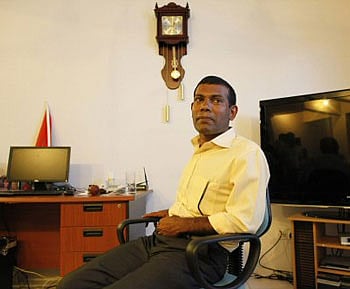
A day after he was ousted as the Malidivian president, Mohamed Nasheed has said what happened in the country should be traced to former dictator Maumoon Abdul Gayoom's network and a result of his own vice president's suspected role in planning the coup.
In an article, "The Dregs of Dictatorship", in the New York Times, the former president said: "Dictatorships don't always die when the dictator leaves office."
According to Nasheed, the wave of revolutions that toppled autocrats in Tunisia, Egypt, Libya and Yemen last year was certainly cause for hope.
"But the people of those countries should be aware that, long after the revolutions, powerful networks of regime loyalists can remain behind and can attempt to strangle their nascent democracies."
Nasheed said he learned this lesson quickly when: "My country, the Maldives, voted out president Maumoon Abdul Gayoom, its iron-fisted ruler, back in 2008, in historic elections that swept away three decades of his authoritarian rule. And yet the dictatorship bequeathed to the infant democracy a looted treasury, a ballooning budget deficit and a rotten judiciary."
"I was elected that year... For the first time in its history, the Maldives -- a group of islands in the Indian Ocean -- had a democratically elected president, parliament and local councils," Nasheed noted.
"But it also had a judiciary handpicked by the former president, which was now hiding behind a democratic constitution. These powerful judges provided protection for the former president, his family members and political allies, many of whom are accused of corruption, embezzlement and human rights crimes."
According to Nasheed, at the same time, new laws guaranteeing freedom of speech were abused by a new force in Maldivian politics: Islamic extremists.
"The former president’s cabinet members threw anti-Semitic and anti-Christian slurs at my government...," Nasheed wrote, "claiming that democracy granted them and their allies licence to call for violent jihad and indulge in hate speech."
Nasheed said his government asked the UN "to help us investigate judicial abuses and ordered the arrest of Abdulla Mohamed, the chief judge of the Criminal Court, on charges of protecting the former president and corrupting the judicial system."
"However, in a dramatic turn of events on Tuesday, the former president’s
supporters protested in the streets, and police officers and army personnel loyal to the old government mutinied and forced me, at gunpoint, to resign," said Nasheed.
"To avoid bloodshed, I did so," said Nasheed, "I believe this to be a coup d’état and suspect that my vice president, who has since been sworn into office, helped to plan it."
Nasheed wrote: "Choosing to stand up to the judge was a controversial decision, but I feel I had no choice."